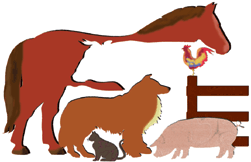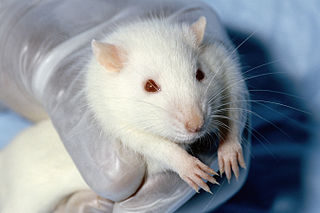
Animal testing, also known as animal experimentation, animal research and in vivo testing, is the use of non-human animals in experiments that seek to control the variables that affect the behavior or biological system under study. This approach can be contrasted with field studies in which animals are observed in their natural environments or habitats. Experimental research with animals is usually conducted in universities, medical schools, pharmaceutical companies, defense establishments and commercial facilities that provide animal-testing services to industry. The focus of animal testing varies on a continuum from pure research, focusing on developing fundamental knowledge of an organism, to applied research, which may focus on answering some question of great practical importance, such as finding a cure for a disease. Examples of applied research include testing disease treatments, breeding, defense research and toxicology, including cosmetics testing. In education, animal testing is sometimes a component of biology or psychology courses. The practice is regulated to varying degrees in different countries.
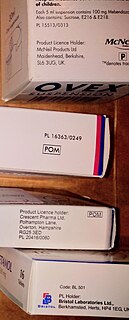
A prescription drug is a pharmaceutical drug that legally requires a medical prescription to be dispensed. In contrast, over-the-counter drugs can be obtained without a prescription. The reason for this difference in substance control is the potential scope of misuse, from drug abuse to practicing medicine without a license and without sufficient education. Different jurisdictions have different definitions of what constitutes a prescription drug.

Antivenom, also known as antivenin, venom antiserum and antivenom immunoglobulin, is a medication made from antibodies which is used to treat certain venomous bites and stings. They are recommended only if there is significant toxicity or a high risk of toxicity. The specific antivenom needed depends on the species involved. It is given by injection.

The Association of Zoos and Aquariums (AZA), previously the American Zoo and Aquarium Association and originally the American Association of Zoological Parks and Aquariums, is a 501(c)(3) nonprofit organization founded in 1924 dedicated to the advancement of North American zoos and public aquariums in the areas of conservation, education, science, and recreation. The AZA is headquartered in Silver Spring, Maryland, United States.
Covance Inc. is a contract research organization (CRO) headquartered in Princeton, New Jersey, providing nonclinical, preclinical, clinical and commercialization services to pharmaceutical and biotechnology industries. The company is owned by LabCorp and employs more than 50,000 people in over 60 countries. According to its website, it is one of the largest companies of its kind in the world, with annual revenues of over $2 billion. It claims to provide the world's largest central laboratory network. It became a publicly traded company in 1997 after being spun off by Corning Incorporated in 1996. In 2018, the Covance parent company, Laboratory Corporation of America Holdings (LabCorp), was rated one of the best places to work for LGBTQ equality by HCR
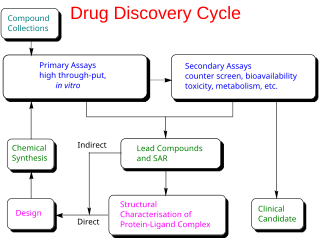
In drug development, preclinical development, also named preclinical studies and nonclinical studies, is a stage of research that begins before clinical trials can begin, and during which important feasibility, iterative testing and drug safety data are collected.

The United States Food and Drug Administration's Investigational New Drug (IND) program is the means by which a pharmaceutical company obtains permission to start human clinical trials and to ship an experimental drug across state lines before a marketing application for the drug has been approved. Regulations are primarily at 21 C.F.R. 312. Similar procedures are followed in the European Union, Japan, and Canada.

Off-label use is the use of pharmaceutical drugs for an unapproved indication or in an unapproved age group, dosage, or route of administration. Both prescription drugs and over-the-counter drugs (OTCs) can be used in off-label ways, although most studies of off-label use focus on prescription drugs.
The Office of Laboratory Animal Welfare (OLAW) oversees the care and use of research animals in Public Health Service (PHS)-funded research. The Public Health Service consists of the National Institutes of Health (NIH), Centers for Disease Control and Prevention (CDC), the Food and Drug Administration (FDA), the Agency for Healthcare Research and Quality (AHRQ), the Indian Health Service (IHS), and the Substance Abuse and Mental Health Services Administration (SAMHSA). The agencies of the PHS are a part of the U.S. Department of Health and Human Services.
Animal Science is described as "studying the biology of animals that are under the control of humankind." It can also be described as the production and management of farm animals. Historically, the degree was called animal husbandry and the animals studied were livestock species, like cattle, sheep, pigs, poultry, and horses. Today, courses available now look at a far broader area to include companion animals like dogs and cats, and many exotic species. Degrees in Animal Science are offered at a number of colleges and universities. Typically, the Animal Science curriculum not only provides a strong science background, but also hands-on experience working with animals on campus-based farms.

A great ape research ban, or severe restrictions on the use of great apes in research, is currently in place in the Netherlands, New Zealand, the United Kingdom, Sweden, Germany and Austria. These countries have ruled that chimpanzees, gorillas, and orangutans are cognitively so similar to humans that using them as test subjects is unethical. Austria is the only country in the world where experiments on lesser apes, the gibbons, are completely banned too.
The Division of Acquired Immunodeficiency Syndrome (DAIDS) is a division of the National Institute of Allergy and Infectious Diseases which is part of the National Institutes of Health. It was formed in 1986 as a part of the initiative to address the national research needs created by the advent and spread of the HIV/AIDS epidemic. Specifically, the Division’s mission is to increase basic knowledge of the pathogenesis, natural history, and transmission of HIV disease and to support research that promotes progress in its detection, treatment, and prevention. DAIDS accomplishes this through planning, implementing, managing, and evaluating programs in (1) fundamental basic research, (2) discovery and development of therapies for HIV infection and its complications, and (3) discovery and development of vaccines and other prevention strategies.
Clinical research is a branch of healthcare science that determines the safety and effectiveness (efficacy) of medications, devices, diagnostic products and treatment regimens intended for human use. These may be used for prevention, treatment, diagnosis or for relieving symptoms of a disease. Clinical research is different from clinical practice. In clinical practice established treatments are used, while in clinical research evidence is collected to establish a treatment.
Gillian Rose Langley is a British scientist and writer who specialises in alternatives to animal testing and animal rights. She was, from 1981 until 2009, the science director of the Dr Hadwen Trust for Humane Research, a medical research charity developing non-animal research techniques. She was an anti-vivisection member of the British government's Animal Procedures Committee for eight years, and has worked as a consultant on non-animal techniques for the European Commission, and for animal protection organizations in Europe and the United States. Between 2010 and 2016 she was a consultant for Humane Society International.

Inter-Regional Research Project Number 4 has been established since 1963 by the USDA Cooperative State Research, Education, and Extension Service. IR-4 works in coordination with the Environmental Protection Agency to assist in the collection of residue and efficacy data in support of the registration or reregistration of minor use pesticides and the determination of tolerances for residues of minor use chemicals in or on raw agricultural commodities. IR-4's mission is to facilitate registration of sustainable pest management technology for fruits, vegetables, ornamental plants, and other specialty crops in the United States. While most of the minor uses investigated are small enough that it is not profitable for private business to establish the acceptability of a pesticide for individual specialty crops, collectively the specialty crops covered by the project make up almost half of U.S. agricultural crop production and over $40 billion in sales.

The World Association of Zoos and Aquariums (WAZA) is the "umbrella" organisation for the world zoo and aquarium community. Its mission is to provide leadership and support for zoos, aquariums, and partner organizations of the world in animal care and welfare, conservation of biodiversity, environmental education and global sustainability.

Experiments involving non-human primates (NHPs) include toxicity testing for medical and non-medical substances; studies of infectious disease, such as HIV and hepatitis; neurological studies; behavior and cognition; reproduction; genetics; and xenotransplantation. Around 65,000 NHPs are used every year in the United States, and around 7,000 across the European Union. Most are purpose-bred, while some are caught in the wild.
The New England Anti-Vivisection Society (NEAVS) is a national, registered 501(c)(3) nonprofit organization “dedicated to ending the use of animals in research, testing, and science education” and replacing them with "modern alternatives that are ethically, humanely, and scientifically superior."
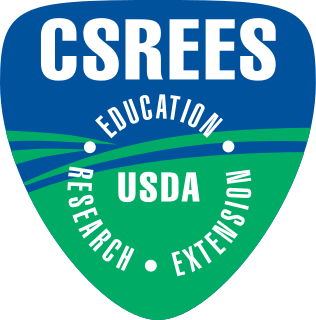
The Cooperative State Research, Education, and Extension Service (CSREES) is an extension agency within the U.S. Department of Agriculture (USDA), part of the executive branch of the federal government. The 1994 Department Reorganization Act, passed by Congress, created CSREES by combining the former Cooperative State Research Service and the Extension Service into a single agency.

